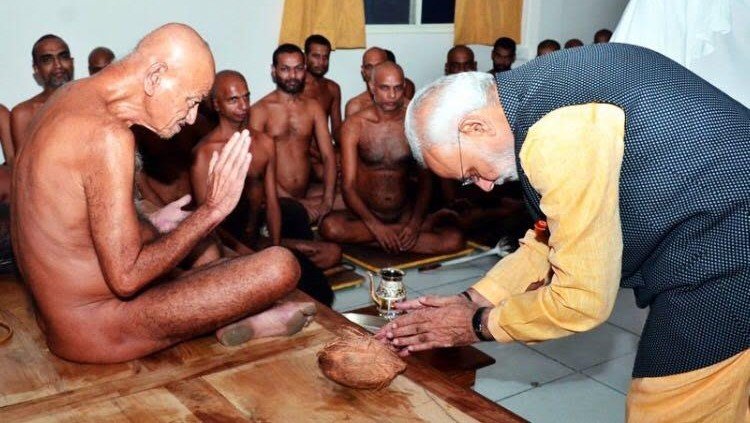The spiritual world and its followers are mourning the loss of one of the most venerated Jain monks, Acharya Vidyasagar Maharaj, who passed away at the age of 77. His departure on a serene Sunday, after embracing 'sallekhna', a Jain ritual of fasting unto death for spiritual cleansing, has left a void that resonates with many. Prime Minister Narendra Modi has expressed his sorrow over this great loss, labelling it as something beyond repair.
- Blogs
- Famous-personalities
- Acharya-vidyasagar-a-spiritual-giant-65d2ebc6bdccdd0001d2bbba
Acharya Vidyasagar: A Spiritual Giant
Famous Personalities • 19 Feb, 2024 • 1,51,884 Views • ⭐ 4.5
Written by Shivani Chourasia

The Final Journey

Acharya Vidyasagar Maharaj, a revered figure within the Jain community, concluded his earthly journey at Chandragiri Teerth, located in the heart of Chhattisgarh's Rajnandgaon district. He was 77 years old. 'Sallekhna', the practice he undertook, is a Jain tradition of voluntary fasting to death aimed at spiritual purification, as stated by the teerth's official announcement.
The Acharya reached the profound state of Samadhi through 'sallekhna' at Chandragiri Teerth at the break of dawn, around 2:35 am. The announcement further detailed that the revered monk had been residing at the teerth in Dongargarh for the past six months. His health had declined over the recent days, leading to the final three days of 'sallekhna', during which he abstained from all food and liquids. This practice, rooted deeply in Jainism, is undertaken for spiritual purification. A procession was organized on Sunday afternoon, allowing the public to pay their respects to the departed soul, with the final rites being conducted at Chandragiri Teerth.
A Spiritual Legacy Remembered

On a significant visit last November 5th, Prime Minister Narendra Modi visited Dongargarh, a key pilgrimage site, to seek blessings from Acharya Vidyasagar Maharaj ahead of the Chhattisgarh Assembly elections. Reflecting on the monk's demise, PM Modi took to X to express his condolences, highlighting the irreparable loss faced by the nation and the monk's invaluable contributions towards spiritual awakening and societal upliftment.
"His life was a beacon of service, contributing significantly towards alleviating poverty, and advancing health and education. I was fortunate to have received his blessings. My encounter with him at Chandragiri Jain Temple last year remains an indelible memory filled with affection and blessings," PM Modi shared.
The Prime Minister emphasized that Acharya Vidyasagar Maharaj's unparalleled contributions would forever inspire future generations. He extended his thoughts and prayers to the monk's numerous followers.
Chhattisgarh's Chief Minister Vishnu Deo Sai also paid homage, describing Acharya Vidyasagar Maharaj as a "reservoir of spiritual wisdom".
"Acharya Shri Vidyasagar Ji Maharaj, with his dynamic knowledge, has left an indelible mark on the country, including Chhattisgarh. His extraordinary work, sacrifice, and penance for the country and society will be remembered for generations. I pay my deepest respects to Acharya Shri Vidyasagar ji," he penned in Hindi on X.
In light of the Jain monk's passing, the state government announced a half-day state mourning on Sunday. The national flag was flown at half-mast, and no state functions or programs were conducted.
A Life of Spiritual Eminence

Acharya Vidyasagar Maharaj was the most esteemed saint within the Digambara Jain sect, known for his deep scholarly pursuits and profound spiritual insight. Born on October 10, 1946, in Sadalga, Karnataka, he was drawn to spirituality from a young age. He became a Digambara monk at 22 under Acharya Gyansagar Ji Maharaj's guidance in 1968 and was elevated to Acharya status four years later.
Throughout his life, Acharya Vidyasagar Maharaj delved into Jain scriptures and philosophy, gaining mastery over Sanskrit, Prakrit, and several other languages. His literary contributions include insightful commentaries, poems, and spiritual texts that have resonated within the Jain community, such as Niranjana Shataka, Bhavana Shataka, Parishah Jaya Shataka, Suniti Shataka, and Shramana Shataka.